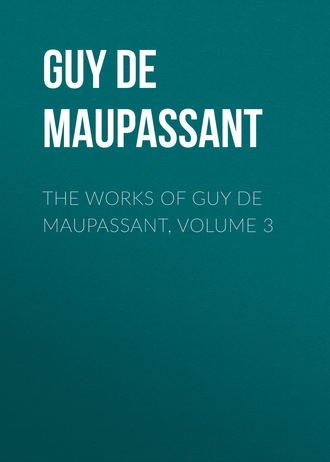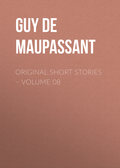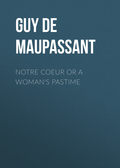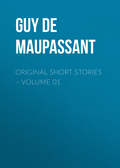
Ги де Мопассан
The Works of Guy de Maupassant, Volume 3
III
Then he smiled, and turning to the waiter who had just come in, he said: "Meanwhile, open us another bottle of champagne, and make the cork pop! It will, at any rate, somewhat accustom us to the day when we shall all be blown up with dynamite ourselves."
KIND GIRLS
Every Friday, regularly, at about eleven o'clock in the morning, he came into the courtyard, put down his soft hat at his feet, struck a few chords on his guitar and then began a ballad in his full, rich voice. And soon at every window in the four sides of that dull, barrack-like building, some girls appeared, one in an elegant dressing gown, another in a little jacket, most of them with their breasts and arms bare, all of them just out of bed, with their hair hastily twisted up, their eyes blinking in the sudden blaze of sunlight, their complexions dull and their eyes still heavy from want of sleep.
They swayed themselves backwards and forwards to his slow melody, and gave themselves up to the enjoyment of it, and coppers, and even silver, poured into the handsome singer's hat, and more than one of them would have liked to have followed the penny which she threw to him, and to have gone with the singer who had the voice of a siren, and who seemed to say to all these amorous girls; "Come, come to my retreat, where you will find a palace of crystal and gold, and wreaths which are always fresh, and happiness and love which never die."
That was what they seemed to hear, those unhappy girls, when they heard him sing the songs of the old legends, which they had formerly believed. That was what they understood by the foolish words of the ballad. Then and nothing else, for how could any one doubt it, on seeing the fresh roses on their cheeks, and the tender flame which flickered like a mystic night-light in their eyes, which had, for the moment, become the eyes of innocent young girls again? But of young girls, who had grown up very quickly, alas! who were very precocious, and who very soon became the women that they were, poor vendors of love, always in search of love for which they were paid.
That was why, when he had finished his second ballad, and sometimes even sooner, concupiscent looks appeared in their eyes. The boatman of their dreams, the water-sprite of fairy tales, vanished in the mist of their childish recollections, and the singer re-assumed his real shape, that of musician and strolling player, whom they wished to pay, to be their lover. And the coppers and small silver were showered on him again, with engaging smiles, with the leers of a street-walker, even with: "p'st, p'st," which soon transformed the barrack-like courtyard into an enormous cage full of twittering birds, while some of them could not restrain themselves, but said aloud, rolling their eyes with desire: "How handsome the creature is! Good heavens, how handsome he is!"
He was really handsome, and nobody could deny it, and even too handsome, with a regular beauty which almost palled on people. He had large, almond-shaped, gentle eyes, a Grecian nose, a bow-shaped mouth, hidden by a heavy moustache, and long, black, curly hair; in short, a head fit to be put into a hair-dresser's window, or, better still, perhaps, onto the front page of the ballads which he was singing. But what made him still handsomer, was that his self-conceit had a look of sovereign indifference for he was not satisfied with not replying to the smiles, the ogles, and the p'st, p'st's, by taking no notice of them; but when he had finished he shrugged his shoulders, he winked mischievously, and turned his lips contemptuously, which said very clearly: "The stove is not being heated for you, my little kittens!"
Often, one might have thought that he expressly wished to show his contempt, and that he tried to make himself thought unpoetical in the eyes of all those amorous girls, and to check their love, for he cleared his throat ostentatiously and offensively, more than was necessary, after singing, as if he would have liked to spit at them. But all that did not make him unpoetical in their eyes, and many of them, most of them, who were absolutely mad on him, went so far as to say that he did it like a swell!
The girl, who in her enthusiasm had been the first to utter that exclamation of intense passion, and who, after throwing him small silver, had thrown him a twenty-franc gold piece, at last made up her mind to have an explanation. Instead of a p'st, p'st, she spoke to him boldly one morning, in the presence of all the others, who religiously held their tongues.
"Come up here," she called out to him, and from habit she added: "I will be very nice, you handsome dark fellow."
At first they were dumbfounded at her audacity, and then all their cheeks flushed with jealousy, and the flame of mad desire shot from their eyes, from every window there came a perfect torrent of:
"Yes, come up, come up." "Don't go to her! Come to me."
And, meanwhile, there was a shower of half-pence, of francs, of gold coins, as well as of cigars and oranges, while lace pocket handkerchiefs, silk neckties, and scarfs fluttered in the air and fell round the singer, like a flight of many colored butterflies.
He picked up the spoil calmly, almost carelessly, stuffed the money into his pocket, made a bundle of the furbelows, which he tied up as if they had been soiled linen, and then raising himself up, and putting his felt hat on his head, he said:
"Thank you, ladies, but indeed I cannot."
They thought that he did not know how to satisfy so many demands at once, and one of them said: "Let him choose."
"Yes, yes, that is it!" they all exclaimed unanimously.
But he repeated: "I tell you, I cannot."
They thought he was excusing himself out of gallantry, and several of them exclaimed, almost with tears of emotion: "Women are all heart!" And the same voice that had spoken before, (it was one of the girls who wished to settle the matter amicably), said: "We must draw lots."
"Yes, yes, that is it," they all cried. And again there was a religious silence, more religious than before, for it wras caused by anxiety, and the beatings of their hearts may have been heard.
The singer profited by it, to say slowly: "I cannot have that either; nor all of you at once, nor one after the other; nothing! I tell you that I cannot."
"Why? Why?" And now they were almost screaming, for they were angry and sorry at the same time. Their cheeks had gone from scarlet to livid, their eyes flashed fire, and some shook their fists menacingly.
"Silence!" the girl cried, who had spoken first. "Be quiet, you pack of huzzys! Let him explain himself, and tell us why!"
"Yes, yes, let us be quiet! Make him explain himself in God's name!"
Then, in the fierce silence that ensued, the singer said, opening his arms wide, with a gesture of despairing inability to do what they wanted:
"What do you want? It is very amusing, but I cannot do more. I have two girls of my own already, at home."
PROFITABLE BUSINESS
He certainly did not think himself a saint, nor had he any hypocritical pretensions to virtue, but, nevertheless, he thought as highly of himself as much as he did of anybody else, and perhaps, even a trifle more highly. And that, quite impartially, without any more self love than was necessary, and without his having to accuse himself of being self conceited. He did himself justice, that was all, for he had good moral principles, and he applied them, especially, if the truth must be told, not only to judging the conduct of others, but also, it must be allowed, in a measure for regulating his own conduct, as he would have been very vexed if he had been able to think of himself:
"On the whole, I am what people call a perfectly honorable man."
Luckily, he had never (oh! never), been obliged to doubt that excellent opinion which he had of himself, which he liked to express thus, in his moments of rhetorical expansion:
"My whole life gives me the right to shake hands with myself."
Perhaps a subtle psychologist would have found some flaws in this armor of integrity, which was sanctimoniously satisfied with itself. It was, for example, quite certain that our friend had no scruples in making profit out of the vices or misfortunes of his neighbors, provided that he was not in his own opinion, the person who was solely, or chiefly responsible for them. But, on the whole, it was only one manner of looking at it, nothing more, and there were plenty of materials for casuistic arguments in it. This kind of discussion is particularly unpleasant to such simple natures as that of his worthy fellow, who would have replied to the psychologist.
"Why go on a wild goose chase? As for me, I am perfectly sincere."
You must not, however, believe that this perfect sincerity prevented him from having elevated views. He prided himself on having a weakness for imagination and the unforeseen, and if he would have been offended at being called a dishonorable man, he would, perhaps have been still more hurt if anybody had attributed middle-class tastes to him.
Accordingly, in love affairs, he expressed a most virtuous horror of adultery, for if he had committed it, it would not have been able to bear that testimony to himself, which was so sweet to his conscience:
"Ah! As for me, I can declare that I never wronged anybody!"
While, on the other hand, he was not satisfied with pleasure which was paid for by the hour, and which debases the noblest desires of the heart, to the vulgar satisfaction of a physical requirement. What he required, so he used to say, while lifting his eyes up to heaven was:
"Something rather more ideal than that!"
That search after the ideal did not, indeed, cost him any great effort, as it was limited to not going to licensed houses of ill-fame, and to not accosting streetwalkers with the simple words: "How much?"
It consisted chiefly in wishing to be gallant even with such women, and in trying to persuade himself that they liked him for his own sake, and in preferring those whose manner, dress and looks allowed room for suppositions and romantic illusions, such as:
"She might be taken for a little work-girl who has not yet lost her virtue."
"No, I rather think she is a widow, who has met with misfortunes."
"What if she be a fashionable lady in disguise!"
And other nonsense, which he knew to be such, even while imagining it, but whose imaginary flavor was very pleasant to him, all the same.
With such tastes, it was only natural that this pilgrim followed and pushed up against women in the large shops, and whenever there was a crowd, and that he especially looked out for those ladies of easy virtue, for nothing is more exciting than those half-closed shutters, behind which a face is indistinctly seen, and from which one hears a furtive: "P'st! P'st!"
He used to say to himself: "Who is she? Is she young and pretty? Is she some old woman, who is terribly skillful at her business, but who yet does not venture to show herself any longer? Or is she some new beginner, who has not yet acquired the boldness of an old hand? In any case, it is the unknown, perhaps, that is my ideal during the time it takes me to find my way upstairs;" and always as he went up, his heart beat, as it does at a first meeting with a beloved mistress.
But he had never felt such a delicious shiver as he did on the day on which he penetrated into that old house in the blind alley in Ménilmontant. He could not have said why, for he had often gone after so-called love in much stranger places; but now, without any reason, he had a presentiment that he was going to meet with an adventure, and that gave him a delightful sensation.
The woman who had made the sign to him, lived on the third floor, and all the way upstairs his excitement increased, until his heart was beating violently when he reached the landing. At the same time, he was going up, he smelt a peculiar odor, which grew stronger and stronger, and which he had tried in vain to analyze, though all he could arrive at was, that it smelt like a chemist's shop.
The door on the right, at the end of the passage, was opened as soon as he put his foot on the landing, and the woman said, in a low voice:
"Come in, my dear."
A whiff of a very strong smell met his nostrils through the open door, and suddenly he exclaimed:
"How stupid I was! I know what it is now; it is carbolic acid, is it not?"
"Yes," the woman replied. "Don't you like it, dear? It is very wholesome, you know."
The woman was not ugly, although not young; she had very good eyes, although they were sad and sunken in her head; evidently she had been crying, very much quite recently, and that imparted a special spice to the vague smile which she put on, so as to appear more amiable.
Seized by his romantic ideas once more, and under the influence of the presentiment which he had had just before, he thought – and the idea filled him with pleasure:
"She is some widow, whom poverty has forced to sell herself."
The room was small, but very clean and tidy, and that confirmed him in his conjecture, as he was curious to verify its truth, he went into the three rooms which opened into one another. The bedroom, came first; next there came a kind of a drawing-room, and then a dining-room, which evidently served as a kitchen, for a Dutch tiled stove stood in the middle of it, on which a stew was simmering, but the smell of carbolic acid was even stronger in that room. He remarked on it, and added with a laugh:
"Do you put it with your soup?"
And as he said this, he laid hold of the handle of the door which led into the next room, for he wanted to see everything, even that nook, which was apparently a store cupboard, but the woman seized him by the arm, and pulled him violently back.
"No, no," she said, almost in a whisper, and in a hoarse and suppliant voice, "no, dear, not there, not there, you must not go in there."
"Why?" he said, for his wish to go in had only become stronger.
"Because if you go in there, you will have no inclination to remain with me, and I so want you to stay. If you only knew!"
"Well, what?" And with a violent movement, he opened the glazed door, when the smell of carbolic acid seemed almost to strike him in the face, but what he saw, made him recoil still more, for on a small iron bedstead, lay the dead body of a woman fantastically illuminated by a single wax candle, and in horror he turned to make his escape.
"Stop, my dear," the woman sobbed; and clinging to him, she told him amidst a flood of tears, that her friend had died two days previously, and that there was no money to bury her. "Because," she said, "you can understand that I want it to be a respectable funeral, we were so very fond of each other! Stop here, my dear, do stop. I only want ten francs more. Don't go away."
They had gone back into the bedroom, and she was pushing him towards the bed:
"No," he said, "let me go. I will give you the ten francs, but I will not stay here; I cannot."
He took his purse out of his pocket, extracted a ten-franc piece, put it on the table, and then went to the door; but when he had reached it, a thought suddenly struck him, as if somebody were reasoning with him, without his knowledge.
"Why lose these ten francs? Why not profit by this woman's good intentions. She certainly did her business bravely, and if I had not known about the matter, I should certainly not have gone away for some time … Well then?"
But other obscurer suggestions whispered to him:
"She was her friend! … They were so fond of each other! Was it friendship or love? Oh! love apparently. Well, it would surely be avenging morality, if this woman were forced to be faithless to that monstrous love?" And suddenly the man turned round and said in a low and trembling voice: "Look here! If I give you twenty francs instead of ten, I suppose you could buy some flowers for her, as well?"
The unhappy woman's face brightened with pleasure and gratitude.
"Will you really give me twenty?"
"Yes," he replied, "and more perhaps. It quite depends upon yourself."
And with the quiet conscience of an honorable man who, at the same time, is not a fool he said gravely:
"You need only be very complaisant."
And he added, mentally: "Especially as I deserve it, as in giving you twenty francs I am performing a good action."
VIOLATED
"Really," Paul repeated, "really!"
"Yes, I who am here before you have been violated, and violated by!.. But if I were to tell you immediately by whom, there would be no story, eh? And as you want a story, eh? And as you want a story, I will tell you all about it from beginning to end, and I shall begin at the beginning.
"I had been shooting over the waste land in the heart of Brittany for a week, which borders on the Black Mountain. It is a desolate and wild country, but it abounds in game. One can walk for hours without meeting a human being, and when one meets anybody, it is just the same as if one had not, for the people are absolutely ignorant of French, and when I got to an inn at night, I had to employ signs to let the people know that I wanted supper and bed.
"As I happened to be in a melancholy frame of mind at the time, that solitude delighted me, and my dog's companionship was quite enough for me, and so you may guess my irritation when I perceived one morning that I was being followed, absolutely followed, by another sportsman who seemed to wish to enter into conversation with me. The day before, I had already noticed him obstructing the horizon several times, and I had attributed it to the chances of sport, which brought us both to the same likely spots for game, but now I could not be mistaken! The fellow was evidently following me, and was stretching his little pair of compasses as much as he could, so as to keep up with my long strides, and took short cuts, so as to catch me up at the half circle.
"As he seemed bent upon the matter, I naturally grew obstinate also, and he spent his whole day in trying to catch me up, while I spent mine in trying to baffle him, and we seemed to be playing at hide-and-seek; the consequences were, that when it was getting dark, I had completely lost myself in the most deserted part of the moor. There was no cottage near, and not even a church spire in the distance. The only land-mark, was the hateful outline of that cursed man, about five hundred yards off.
"Of course he had won the game! I should have to put a good face on the matter, and allow him to join me, or rather I should have to join him myself, if I did not wish to sleep in the open air and with an empty stomach, and so I went up to him, and asked my way in a half-surly manner.
"He replied very affably, that there was no inn in the neighborhood, as the nearest village was five leagues off, but that he lived only about an hour's walk off, and that he considered himself very fortunate in being able to offer me hospitality.
"I was utterly done up, and how could I refuse? So we went off through the heather and furze; I walking slowly because I was so tired, and he went tripping along merrily with his legs like a basset hound's, which seemed untirable.
"And yet he was an old man, and not strongly built, for I could have knocked him over by blowing on him; but how he could walk, the beast!
"But he was not a troublesome companion, as I imagined he would have been, and he did not at all seem to wish to enter into conversation with me, as I feared he would. When he had given his invitation, and I had accepted it and thanked him in a few words, he did not open his lips again, and we walked on in silence, and only his glances worried me, for I felt them on me, as if he wished to force me into an intimacy, which my closed lips refused. But on the whole, his tenacious looks, which I noticed furtively, appeared sympathetic and even admiring – yes; really admiring!
"But I could not give him as good as he brought, for he was certainly not handsome; his legs were short, and rather bandy and he was thin and narrow-chested. His face was like a bit of parchment, furrowed and wrinkled, without a hair on it to hide the folds in his skin. His hair resembled that of an Ignorantin9 brother, with its gray locks falling onto his greasy collar; he had a nose like a ferret, and rat's eyes, but he was able to offer me food and quarters for the night, and it was not requisite that he should be handsome, in order to do that.
"Capital food, and very comfortable quarters! A manorial dwelling, a real old, well-furnished manor-house; and in the large dining-room, in front of the huge fireplace, where a large fire was blazing, dinner was laid; I will say no more than that! A hotch-potch, which had been stewing since morning, no doubt! A salmis of woodcock, in defense of which angels would have taken up arms; buckwheat cakes, in cream, flavored with aniseed, and a cheese, which is a rare thing and hardly ever to be found in Brittany, a cheese to make any one eat a four pound loaf if he only smelt the rind! The whole washed clown by Chambertin, and then brandy distilled by cider, which was so good that it made a man fancy that he had swallowed a deity in velvet breeches; not to mention the cigars, pure, smuggled havannahs; large, strong, not dry but green, on the contrary, which made a strong and intoxicating smoke.
"And how the little old gentleman stuffed, and drank and smoked! He was an ogre, a choirister, a sapper, and so was I, I must confess, and, upon my word, I cannot remember what we talked about during our Gargantuan feed! But we certainly talked, but what about? About shooting, certainly, and about women most probably. Confound it! Among men, after drinking! Yes, yes, about women, I am quite sure, and he told some funny stories, did the little old man! Especially about a portrait which was hanging over the large fireplace, and which represented his grandmother, a marchioness of the old régime. She was a woman who had certainly played some pranks, and they said that she was still frisky and had good legs and thighs when she was seventy.
"'It is extraordinary,' I remarked, 'how like you are to that portrait.'
"'Yes,' the old man replied with a smile; and then he added in his harsh, tremulous voice: 'I resemble her in everything. I am only sixty, and I feel as if I should have lusty, hot blood in me until I am seventy.'
"And then suddenly, very much moved, and looking at me admiringly, as he had done once before, he said to the portrait:
"'I say, marchioness, what a pity that you did not know this handsome young fellow!'
"I remembered that apostrophe and that look very well, when I went to bed about an hour later, nearly drunk, in the large room papered in white and gold, to which I was shown by a tall, broad-shouldered footman, who wished me good-night in Breton.
"Good-night, yes! But that implied going to sleep, which was just what I could not do. The Chambertin, the cider brandy and the cigars had certainly made me drunk, but not so as to overcome me altogether. On the contrary, I was excited, my nerves were highly strung, my blood was heated, and I was in a half-sleep in which I felt that I was very much alive, and my whole being was in a vibration and expansion, just as if I had been smoking hashecah.
"Of course! That was it; I was dreaming while I was awake; but I saw the door open and the marchioness come in, who had stepped down, out of her frame. She had taken off her furbelows, and was in her nightgown. Her high head-dress was replaced by a simple knot of ribbon, which confined her powdered hair into a small chignon, but I recognized her quite plainly, by the trembling light of the candle which she was carrying. It was her face with its piercing eyes, its pointed nose and its smiling and sensual mouth. She did not look so young to me as she appeared in her portrait. Bah! Perhaps that was merely caused by the feeble, flickering light! But I had not even time to account for it, not to reflect on the strangeness of the sight, nor to discuss the matter with myself and to say: 'Am I dead drunk, or is it a ghost?'
"No, I had no time, and that is the fact, for the candle was suddenly blown out and the marchioness was in my bed and holding me in her arms, and one fixed idea, the only one that I had, haunted me, which was:
"'Had the marchioness good limbs, and was she still frisky at seventy?' And I did not care much if she was seventy and if she was a ghost or not; I only thought of one thing: 'Has she really good limbs?'"
"By Jove, yes! She did not speak. Oh, marchioness! marchioness! And suddenly in spite of myself and to convince myself that it was not a mere fantastic dream, I exclaimed:
"'Why, good heavens! I am not dreaming!'
"'No, you are not dreaming,' two lips replied, trying to press themselves against mine.
"But, oh! horror! The mouth smelt of cigars and brandy! The voice was that of the little old man!
"With a bound I sent him flying on to the ground, and jumped out of bed, shouting:
"'Beast! beast!'
"Then I heard the door slam, and bare feet pattering on the stairs as he ran away; so I dressed hastily in the dark and went downstairs, still shouting.
"In the hall below, where I could see through the upper windows that the dawn was breaking, I met the broad-shouldered footman, who was holding a great cudgel in his hand. He was bawling also, in Breton, and pointed to the open door, outside where my dog was waiting. What could I say to this savage who did not speak French? Should I face his cudgel? There was no reason for doing so; and besides, I was even more ashamed than furious; so I hastily took up my gun and my game-bag, which were in the hall, and went off without turning round.
"Disgusted with sport in that part of the country, I returned to Brest the same day, and there, timidly and with many precautions, I tried to find out something about the little old man…
"'Oh, I know!' somebody replied at last to my question; 'you are speaking of the manor-house at Hervénidozse, where the old countess lives, who dresses like a man and sleeps with her coachman.'
"And with a deep sigh of relief, and much to the astonishment of my informant, I replied:
"'Oh! so much the better!'"







